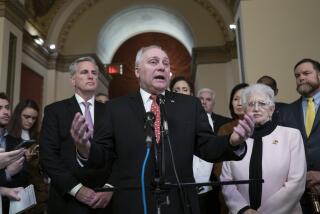House Panel Approves New Oil Taxes to Raise $4 Billion
- Share via
WASHINGTON — The House Ways and Means Committee, pushing toward completion of its work on sweeping tax legislation by the end of this week, Wednesday approved a set of new taxes on the oil industry that would raise $4.2 billion over five years.
The proposal “didn’t kill us. (It) just chopped off an arm and a leg. I’m alive; I’m just not happy,” said Rep. W. Henson Moore, a Republican from oil-producing Louisiana and a leading opponent of the proposed regulations. The committee approved the plan, 29 to 4.
It was tougher on the industry than the plan set forward by President Reagan, which would raise $1.9 billion over five years, but fell far short of the $9.1-billion revenue goal set by committee Chairman Dan Rostenkowski (D-Ill.)
To make up most of the difference, the committee proposed a new rule that would eliminate the tax savings for certain types of mergers in which a company technically liquidates itself into the hands of an acquiring firm.
One of the greatest blows the proposal would deal the oil industry would be the loss of one of its most coveted tax write-offs, the percentage depletion allowance compensating for reductions in oil reserves.
The allowance has long been a target for lawmakers, who ended its use by big integrated oil firms a decade ago and made it available only to smaller, independent oil companies. Under the committee’s plan, the depletion allowance for most wells would be phased out over three years.
However, it would be retained for certain wells, known as stripper wells, that produce less than 10 barrels of oil a day and might be abandoned otherwise. Such wells account for 15% of the nation’s oil production.
In dealing with the politically charged issue of oil industry tax breaks, the usual alliance between Treasury Secretary James A. Baker III and Rostenkowski broke down.
Generous Treatment
Baker, according to lawmakers, has been supporting the continuation of generous tax treatment for the energy industry along the lines proposed in Reagan’s tax package. That approach would increase oil industry taxes by only about $2 billion over five years.
But Rostenkowski has consistently advocated curtailing oil and gas tax preferences, and he offered a plan several weeks ago that would raise an additional $9 billion from the industry over the same period.
When Baker and Rostenkowski met Tuesday behind closed doors, one staff member said, “there was a lot of heated conversation,” and the committee broke up abruptly that night immediately before it was scheduled to take up the issue because Rostenkowski “just got fed up with all the back-biting.”
The industry blunted Rostenkowski’s effort to significantly reduce its write-offs for so-called intangible drilling costs, such as labor. Instead, the committee approved a provision that allows full deductions for more than three-quarters of such costs.
Separately, a working group within the committee was deadlocked in its efforts to devise a means of collecting more taxes from wealthy individuals and corporations who are able to use existing tax law to whittle their taxes far below average rates.
Minimum Tax Discussed
Support for a minimum tax, regardless of most deductions, has grown with revelations that existing tax law has allowed such huge and profitable corporations as Boeing Corp. and General Electric Co. to pay no taxes in the last three years.
The Internal Revenue Service also estimates that at least 1,000 individuals earning more than $200,000 a year have paid almost no taxes in recent years, thanks to the tax code’s wide array of credits and deductions.
Despite the impasse over the minimum-tax issue, committee staff members expressed optimism that the panel will meet its goal of completing work on the bill by Friday.
Still ahead are such contentious issues as taxing fringe benefits and curtailing deductions for business-related travel and entertainment expenses.
Fierce real estate lobbying preserved many industry tax preferences in Ways and Means Committee bill. See Business Section.
More to Read
Get the L.A. Times Politics newsletter
Deeply reported insights into legislation, politics and policy from Sacramento, Washington and beyond. In your inbox twice per week.
You may occasionally receive promotional content from the Los Angeles Times.










